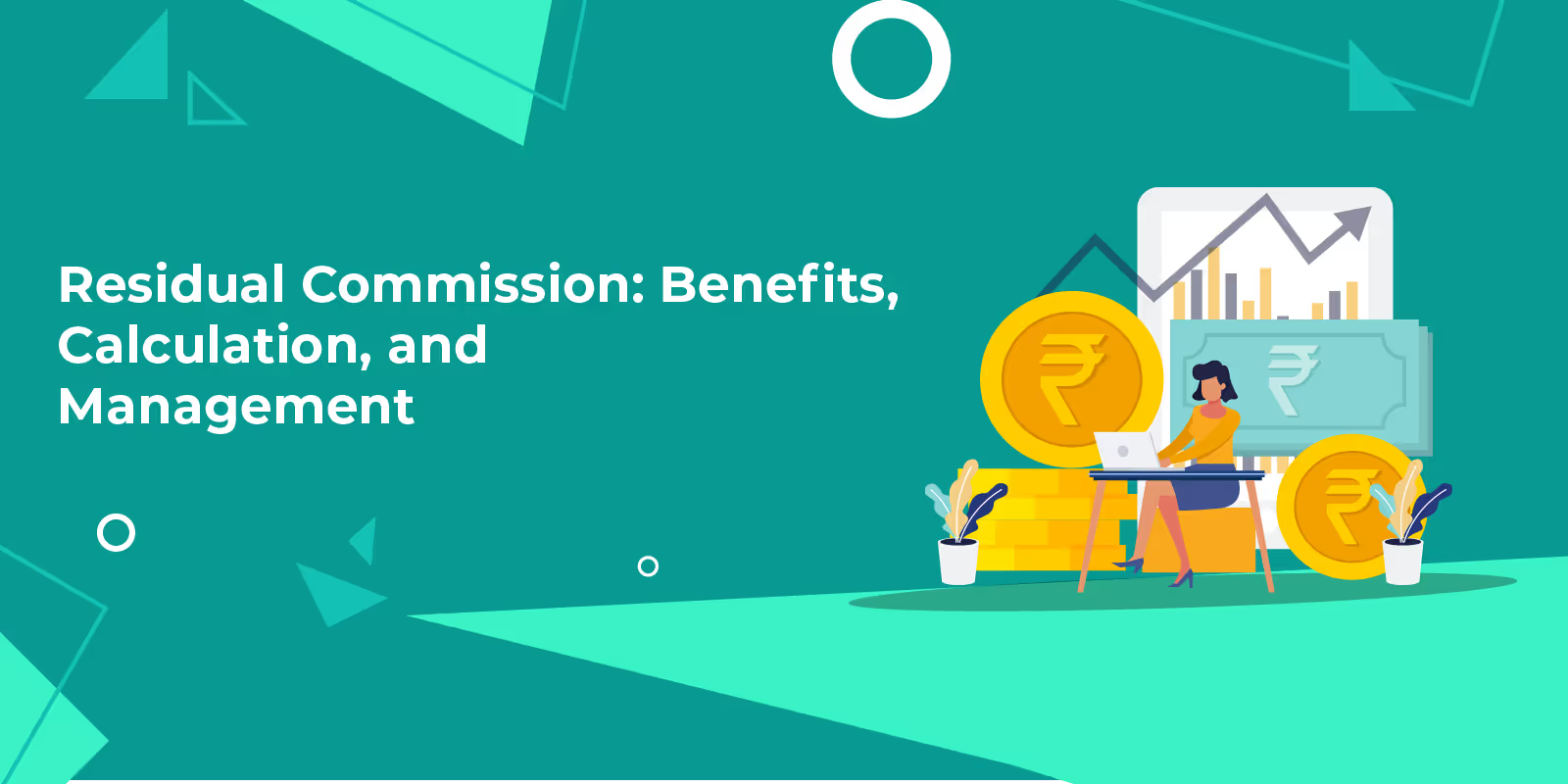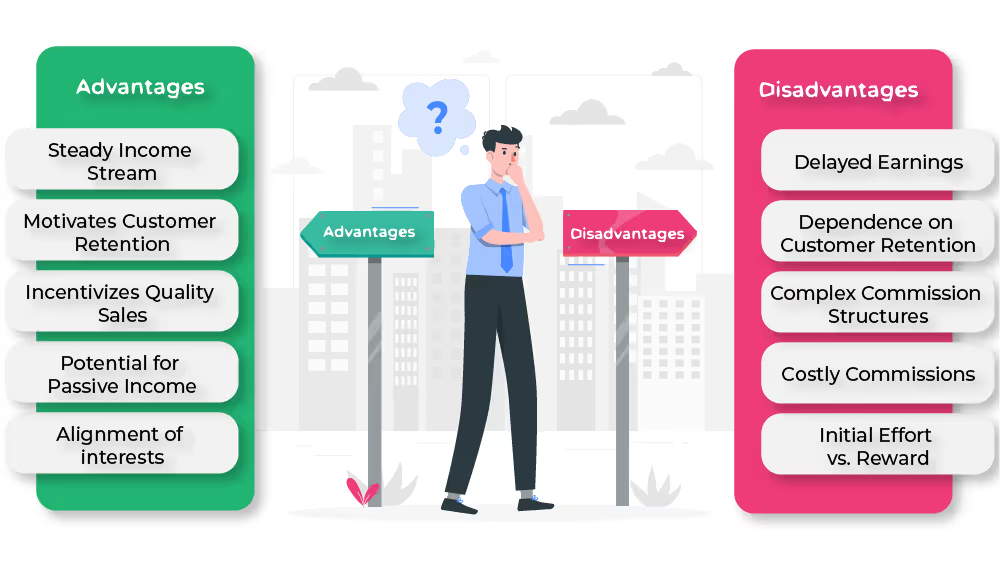
Blog
Residual Commission: Benefits, Calculation, and Management
August 12, 2024


Key Insights
How about your past efforts pay off now? Like literally!
Think about this scenario: you put the effort into finding a high-quality lead. Consistently strategize your sales pipeline to convert them through each stage. Eventually, work your way through closing the deal with them.
After all these persistent efforts you got your rightful commission paid.
However, a year later you get another commission from the same deal. Happens that the client decided to extend the contract and the company paid you for finding this high-value customer.
Now that's happiness.
Surely, next time while finding prospects you will be extra careful to find the hot leads who will continue their partnership with the company for a longer period.
This reward for your past efforts is called residual commission.
In this blog, we will explain everything about residual commission structure. Its advantages and disadvantages, when and how to use it, and a few residual commission examples.
So let's get reading.
What is the Residual Commission?
Residual commission refers to the recurring incentive payment a sales rep receives when their customer renews their subscription or extends their contract.
For example, a sales rep receives a commission when a client closes a deal. A year later they decided to extend the contract for another year. The sales rep will be paid a residual commission for this positive action from the customer.
Residual commissions provide steady and ongoing income for the sales rep. This encourages them to work on building strong customer relationships, focus on customer retention, and thereby improve their earnings over time.
Advantages and Disadvantages of Residual Commission

When and How to Use Residual Commissions
❓When to Use Residual Sales Commission?
Residual commission is a good choice of the commission structure in the following scenarios:
- Businesses with subscription-based services like software as a service.
- Industries that maintain long-term relationships like insurance.
- Ideal for businesses with membership models like gyms.
- Used in industries where customers sign up for ongoing services like telecom.
- Effective for companies focusing on increasing customer retention.
- Suitable for companies that sell high lifetime value products.
❓How to Calculate Residual Commissions?
Residual sales commission refers to the incentive a sales rep earns for recurring revenue.
For example, a sales rep sold software for Rs 10,000. According to their SaaS commission plan, they will receive a sales commission rate by industry of 10% for this sale. Whenever the customer renews the contract, he gets a commission of 5% on the recurring revenue.
So the initial sales commission they will receive is
The next year, the customer paid a subscription fee of Rs 5000 to renew the contract. The residual commission the sales rep will earn is
❓Payment of Residual Commission
Residual commissions are paid periodically. Based on the industry standards, company policies, product lifecycle, and nature of the product this cycle can vary.
Depending on these factors it can be monthly, quarterly, or annual.
For example, in a subscription-based business such as a streaming service or SaaS, where users must renew their subscriptions monthly, the sales rep will also receive monthly payments.
On the other hand, sales reps who handle products like vehicles, equipment, or investment accounts that require yearly renewal, will be paid annually.
Residual Commission Examples Across Industries
Many industries make the best use of residual commission structure to incentivize their sales rep efforts.
Here is a list of residual commission examples across industries to help you get a better idea:

Insurance
An insurance agent sold an insurance policy with an annual premium of 1,00,000. When this sale is closed, the agent will receive a commission of 10% of the revenue generated. For all subsequent renewals, they will receive a 5% commission.
Real Estate
In real estate, the sales agent rented out a property for Rs. 35,000 per month. The tenant paid a commission to the agent for finding a good property and securing a good deal. When the tenant wishes to renew the lease next year, the agent will receive another commission.
Franchises
A businessman franchises his brand by selling the franchise rights for an initial fixed fee. The residual commission comes as an ongoing fee, earned as a percentage of the revenue generated by the franchisee.
Network Marketing
A network marketer earns a commission based on their sales, as well as a commission on the sales made by their distributors. As long as their downline distributors continue making sales, the marketer will receive residual commissions.

Software as a Service
A SaaS sales rep made a sale of a software product. For closing the deal they will get an initial income and for all subsequent monthly/yearly contract renewals, they will earn a residual commission.
The above examples show how residual commissions can be a major motivator for sales reps and keep the business growing consistently.
Automation and Management of Residual Commissions
Automating your residual commission can change the overall operation and management of your sales compensation plans.
- It saves time by reducing the manual effort in data collection and calculation.
- It improves accuracy by minimizing human error.
- It provides clarity and transparency to sales reps on their sales commissions.
- It streamlines the sales commission process and makes payments faster.
- It's a cost-effective option that reduces administrative overhead.
- It ensures legal and tax compliance associated with sales commissions.
(Automation helps easily adapt to ASC 606 changes.)
- It provides better insights into sales performance and commission structures.
This is just the tip of the iceberg of what automation can unlock for your sales commission operations.
Explore the power of automation with Kennect.
Final Thought
The residual commission is a unique ongoing reward where sales reps get paid for their past efforts.
It is a type of incentive compensation where sales reps are encouraged to do their present job correctly for the promise of future predictable revenue.
When sales reps bring high-quality leads with longer customer lifetime value it is not just the company that benefits but themselves as well.
However, the residual commission structure is useful only when sales reps understand the importance and worth of such a deal.
Automation can bring in this clarity and transparency where sales reps understand the specifics of their incentive program, the calculation of their commissions, and the time of payouts.
Kennect supercharges your incentives by offering all these features and more. Book A Demo with Us to learn more about our product and automation.
ReKennect : Stay ahead of the curve!
Subscribe to our bi-weekly newsletter packed with latest trends and insights on incentives.
Thank you! Your submission has been received!
Oops! Something went wrong while submitting the form.
Your data is in safe hands. Check out our Privacy policy for more info




.avif)









